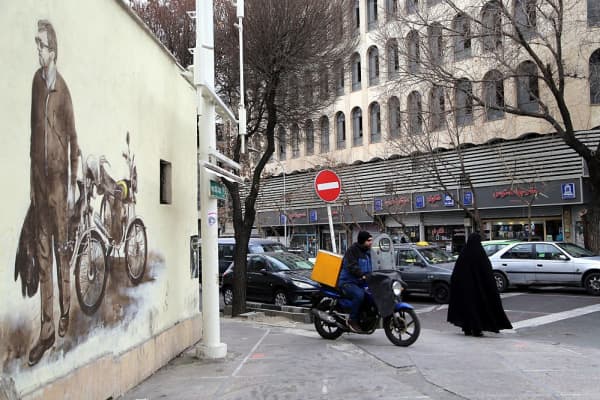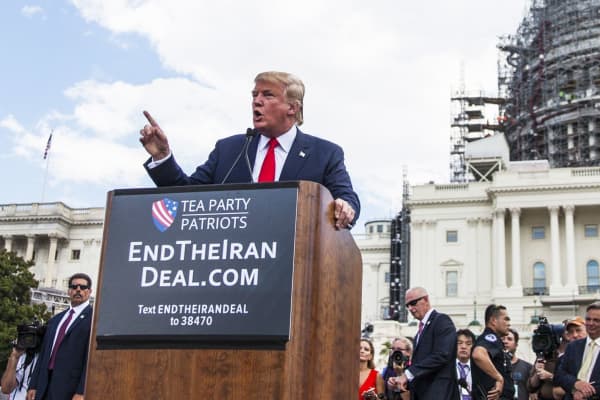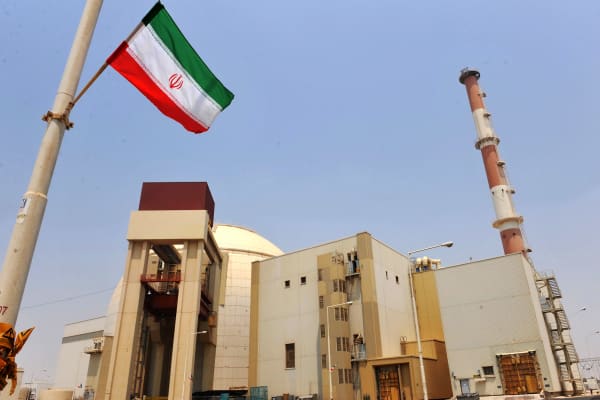CNBC | Holly Ellyatt: The Iranian nuclear deal has looked very fragile since the election of Donald Trump in November 2016 but, so far, the U.S. president has been persuaded to leave the agreement alone.
That position is not likely to last much longer, according to political consultancy Eurasia Group, which predicted the agreement is very unlikely "to survive President Donald Trump's first term in office."
The Iranian nuclear deal, formerly known as the Joint Comprehensive Plan of Action (JCPOA), was struck in 2015 between Iran and China, the U.S., U.K., Russia, France and Germany. It was designed to limit Tehran's nuclear program in return for the lifting of economic sanctions.
Trump has repeatedly criticized the deal, however, opposing terms that would allow Iran to gradually reinstate its nuclear activities (the so-called "sunset clauses") and accusing Iran of violating the terms of the agreement.
[caption id="" align="aligncenter" width="600"]
 Fatemah Bahrami | Anadolu Agency | Getty Images A general view of streets in Tehran, Iran on the first anniversary of nuclear deal between Iran and world powers on January 16, 2017.[/caption]
Fatemah Bahrami | Anadolu Agency | Getty Images A general view of streets in Tehran, Iran on the first anniversary of nuclear deal between Iran and world powers on January 16, 2017.[/caption]In January, Trump demanded that France, Germany, the U.K. and the U.S. Congress "fix" the deal by May 12, by committing to tougher measures against Iran.
Eurasia Group's Chairman Cliff Kupchan said in a note Wednesday that the agreement is unlikely "to survive President Donald Trump's first term in office" and that the "re-imposition of U.S. secondary sanctions" � the sanctions that prevent other countries from doing business with Iran � is likely.
He said Iran, a country that has got its economy back on its feet thanks to the nuclear deal, would likely react with "rhetorical fury" to such a scenario and could "likely lash out" in the Middle East. He explained this could mean Iran using a more aggressive policy in Syria, Lebanon, Iraq, Yemen or � most dangerously � toward Saudi Arabia.
With no love lost between Trump and Iran, the political consultancy reduced the odds of the nuclear deal's survival from 55 percent to 35 percent as it described the main dangers to the deal.
Why the deal is likely to fail
The first threat to the Iran nuclear deal comes in the form of the appointment of "Iran hawks"�John Bolton as national security advisor(he replaces HR McMaster on April 9) and Mike Pompeo as secretary of state.
Kapchan said the combination of Bolton and Pompeo's appointments, coupled with "insufficient progress by the European parties and the U.S. Congress on 'fixing' the nuclear deal, now make it unlikely that the agreement will survive President Donald Trump's first term in office."
[caption id="" align="aligncenter" width="600"]
 Samuel Corum | Anadolu Agency | Getty Images[/caption]
Samuel Corum | Anadolu Agency | Getty Images[/caption]President Donald Trump vowed to end the Iran Nuclear Deal while on the campaign trail. He has continued to criticize Iran as president, though he has refrained from condemning Russia, although both countries support Syria's Bashar al-Assad.
Both Bolton and Pompeo have expressed strong disapproval of Iran with the former suggesting pre-emptive strikes against Iran and�the latter calling the country a "thuggish police state."
"The appointment of Bolton does very much enhance the chance the deal goes down," Kupchan said in the note Wednesday. "He abhors the agreement and is on record supporting the use of force against Iran. And this gentleman will as of 9 April be sitting a short walk from the Oval Office," he said. Meanwhile, Pompeo "is also a big strike" against the JCPOA, Eurasia Group's chairman added.
Aside from Bolton and Pompeo's appointments, Kapchan said the "deal's going down" because of�"insufficient progress" among the U.K., Germany and France�and in the U.S. Congress on implementing fixes to what Trump called "disastrous flaws" in the Iranian deal.
Trump demands
Trump wants an end to clauses in the deal that would allow Iran to enrich uranium beyond the amount usually needed for commercial power production. He also wants a ban on ballistic missile testing and unlimited access for atomic energy inspectors to any military site.
If the U.K., Germany and France, alongside Congress, don't fix these issues by May 12, he said, America will withdraw the pact and sanctions will be reinstated � although this would not be done for a number of years.
[caption id="" align="aligncenter" width="600"]
 Getty Images A reactor building at the Russian-built Bushehr nuclear power plant in Bushehr, Iran.[/caption]
Getty Images A reactor building at the Russian-built Bushehr nuclear power plant in Bushehr, Iran.[/caption]Kapchan noted that there is currently little progress from these Western nations on the deal, where, he said "the leadership and many members do not want the JCPOA to die, but neither do they want to be party to Trump's efforts to kill it, and risk taking the blame."
However, it's not all bad news, Eurasia Group's chairman said, giving the Iran deal a 35 percent chance of survival.
"The main reason we think the deal is down but not totally out is that the EU3 (France, Germany and the U.K.) and Congress could yet meet Trump's demands. He publically said he would not kill the deal if the fixes were implemented, and it would be very hard for him to walk away from that commitment � even if Bolton tries for a walk anyway," Kapchan said, adding that U.S. Congress "could still come through too."
Finally, Trump does not want to risk a war, Kapchan highlighted, where markets would tumble and the risk of terrorism would rise.










